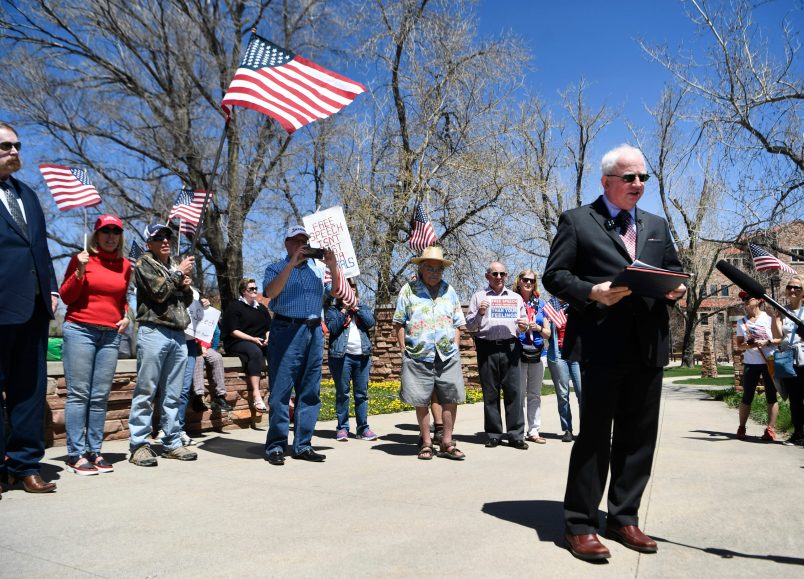A federal judge on Tuesday ordered former Trump attorney John Eastman to turn over dozens of additional emails to the congressional Jan. 6 committee, including what the judge described as potential evidence of a crime and notes on secretive meetings that included a member of Congress and a Trump elector.
Eastman has spent months fighting document requests from the committee, asserting attorney-client privilege over thousands of subpoenaed records, though he has turned over some following court orders.
The lawyer was a key advisor in Trump’s effort to steal a second term by pressuring then-Vice President Mike Pence to discard the results of the 2020 election. After going through Eastman’s latest privilege assertions record-by-record, U.S. District Judge David O. Carter ultimately ordered that Eastman hand over 159 out of 599 challenged documents to the committee.
Potential Evidence Of A Crime
Most notably in Tuesday’s order, Carter ordered Eastman to turn over an email to the committee because it fit the crime-fraud exception to attorney-client privilege — that is, an instance where “a client consults an attorney for advice that will serve [them] in the commission of a fraud or crime.” Carter has previously found that Trump and Eastman likely broke federal laws in their effort to disrupt the certification of Biden’s win.
Tuesday’s ruling expanded the scope of those potential crimes — back to Dec. 22, 2020, when an unnamed attorney explained the risk of bringing litigation over the interpretation of the Electoral Count Act, the law that governs the certification of Electoral College votes and the weak point that Trump sought to exploit on Jan. 6. That email is among those sought by the committee.
“Because the attorney concluded that a negative court ruling would ‘tank the January 6 strategy,’ he encouraged the legal team to avoid the courts,” the judge wrote of the email in question, adding that it cemented the direction of the Jan. 6 plan.
While lawyers are free not to bring cases, Carter wrote, “they are not free to evade judicial review to overturn a democratic election. Accordingly, this portion of the email is subject to the crime-fraud exception and must be disclosed.”
Records Of A Secretive Group
Eastman also sought to withhold documents involving a group described as “civic minded citizens of a conservative viewpoint who meet semi-regularly to socialize and discuss issues of public concern.”
The order doesn’t get more specific, but the judge did note that the documents included an invitation for Eastman to speak to the group on Dec. 8, sent by “the group’s high-profile leader.” On the agenda: “State legislative actions that can reverse the media-called election for Joe Biden.”
At a Dec. 9 meeting, according to the judge’s description, a sitting member of Congress discussed a “[p]lan to challenge the electors in the House of Representatives.”
Another meeting agenda, for Dec. 16, included a Trump elector analyzing “The Constitutional implications of the Electoral College Meeting and What Comes Next,” the judge wrote. Carter ordered those documents to be provided to the committee, but offered to redact the names of presenters listed on meeting agendas “on topics unrelated to the January 6 plan.”
Contacts With Lawmakers
Several records that Eastman sought to protect as confidential actually related to the plan to disrupt the certification of Joe Biden’s electoral college victory in 2021, Carter wrote, and others discussed “alternate,” pro-Trump elector slates in states where Joe Biden won a majority.
“Because these documents only relate to the political plan for January 6, they were not made in anticipation of litigation and thus are not protected,” Carter said.
Also among the records that Carter ordered Eastman to hand over the committee: Discussion of state legislators’ authority, potential press releases from Trump on state electors and various analyses of supposed election irregularities that were distributed to federal and state legislators. Carter said Eastman’s communications included exchanges with lawmakers in Pennsylvania and Georgia, as well as the agent of an Arizona state senator.
Several emails also show Eastman gathering information for members of Congress, the judge said, including a paragraph he described as “recommending talking points for members of Congress on their alleged authority to delay the electoral count.”
The judge noted that Eastman attempted to classify several printed photos of the President as attorney-client confidential, with the former Trump lawyer asserting they included handwritten notes “re issues for anticipated litigation. The truth was more Trumpian: One note “simply celebrates the size of President Trump’s campaign rallies,” the judge said, and others discussed “how to frame President Trump’s potential press statement on certifying alternate electors in swing states.”







Shit is getting deeper for Eastman.
And closer to TFG.
Somehow I think we’re going to see this revisited, and by a different one of Ginni’s spouse’s clerks.
Bottom line. They knew it was wrong - factually, legally and morally. But they proceeded with the plan anyway.
Always is a bad sign when a judge denies your petition because you “been crimin’!”